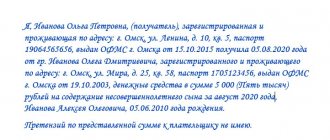1
Issues related to the withholding (receipt) of alimony forcibly or paid voluntarily, as well as the termination of fulfillment of alimony obligations, remain relevant for our society. The situation when a concluded agreement is declared invalid also does not lose its severity.
The fulfillment of alimony obligations is regulated by the norms of family law, in particular, a separate section V of the Family Code of the Russian Federation is devoted to the issues of payment of alimony, its amount, terms, conclusion of voluntary agreements and collection in court. Chapter 16 separately describes the conditions, features and procedure for concluding an alimony agreement.
What is a child support agreement?
First, it is necessary to disclose the very definition of “alimony agreement” and the circumstances under which it can be concluded.
Parents have the right to agree on any method of supporting their children, including they can enter into an agreement on the payment of alimony - clause 1 of Art. 80 IC RF. The document provided for by this article of the RF IC requires mandatory written form and notarization - Art. 100 IC RF.
However, citizens of the Russian Federation are not limited in their rights to enter into other civil contracts with persons not mentioned as a party to compulsory alimony relations - para. 3. clause 53 of the RF PP No. 56. For example, a parent has the right to enter into an agreement on the provision of maintenance with his child who has reached 18 years of age for the period of his full-time education.
But to such an act the general norms of the Civil Code of the Russian Federation apply, and not the special IC of the Russian Federation - para. 3 clause 53 of the RF Armed Forces Resolution No. 56.
See also:
List of documents for filing a claim for alimony collection
Grounds for receiving alimony in the form of a fixed amount (read more...)
Since the method of payment of alimony we are considering - both as a percentage of income and as a fixed amount - applies only to minors, then it is enough for a parent defending the right of a minor child to financial support to prove that the second parent is indeed either the mother or the father of the minor. In other words, the existence of a family relationship between an adult and a child should be documented.
Second case. The magistrate determined that the defendant is obliged to pay one-fourth of the salary + 3,000 rubles for the maintenance of his daughter. in a fixed amount. The defendant objected to this decision, pointing out that his salary is below the subsistence level, and, in addition, he is obliged to pay a bank loan and compensate for damage to another person due to an accident.
Is it possible to change, terminate, or invalidate an alimony agreement?
A notarial alimony agreement can be changed or terminated by mutual consent of the parties in a manner similar to its conclusion. This is done by contacting both parties to a notary to edit a previously certified document and certify it in a new edition - clause 2 of Art. 101 IC RF.
The number of changes and the timing of introduction are not limited by law.
It is permissible to change or terminate such a document in the absence of the consent of the other party only in court and only if there are legal grounds for this - clause 4 of Art. 101 IC RF.
But it can only be declared invalid (challenged) through the courts. The general norms of the Civil Code of the Russian Federation, regulating the invalidation and termination of civil law transactions, apply to a notarial alimony agreement - Art. 101 IC RF.
According to the general norms of civil law, invalid transactions are of two main types - clause 1 of Art. 166 Civil Code of the Russian Federation:
- Recognized as such by a court on relevant legal grounds (disputable).
- Independent of such recognition (negligible).
In the latter case, it is necessary to go to court with a demand to apply the consequences of the nullity of the transaction - clause 3 of Art. 166 of the Civil Code of the Russian Federation.
In both cases, the presence of circumstances that serve as legal grounds for the court to invalidate the alimony agreement is required. These include the grounds provided for:
- Civil legislation for the invalidity of transactions is § 2 of the Civil Code of the Russian Federation.
- Family law for the invalidity of agreements that violate the interests of the recipient of alimony - Art. 102 RF IC.
Such an agreement is recognized by the court as invalid in whole or in part on the grounds provided for in § 2 of the Civil Code of the Russian Federation, which include:
- Confinement with an incompetent person - Art. 171 Civil Code of the Russian Federation. Only his legal representatives can act as a party - Art. 99 RF IC.
- Signing the document in question with a partially capable person without the consent of his trustees - Art. 176 of the Civil Code of the Russian Federation and Art. 99 RF IC.
- Drawing up an act under the influence of deception, mental or physical violence, threats or unfavorable factors - Art. 179 of the Civil Code of the Russian Federation.
- Pretense, imaginary nature of the relevant legal relations - Art. 170 Civil Code of the Russian Federation.
This becomes possible if the conditions for providing maintenance to a child under 18 years of age significantly violate his interests - Art. 102 RF IC. For example, the amount of alimony determined by the parties is less than the alimony payments that he could receive if they were collected through the court - para. 2 clause 56 of the RF Armed Forces Resolution No. 56.
The following people also have the right to go to court to challenge the alimony agreement:
- Legal representatives of a minor child (parents, guardians, trustees).
- Guardianship and trusteeship authorities.
- Prosecutor.
What are the grounds for changing or terminating the alimony agreement?
The legal conditions for changing/terminating the alimony agreement (if there is a dispute) include:
- Significant change for the worse in the financial situation of the payer.
- The appearance or presence of other family members as dependents of the person obligated for alimony.
- Other circumstances worthy of the court's attention.
At the same time, a change in the financial/material situation of the parties is recognized by the court as significant if it has changed so much that if it had been such at the time of the conclusion of the act, it would not have been concluded - clause 55 of the RF Supreme Court No. 56. Because otherwise:
- It would significantly violate the interests of the participants.
- The parties entered into it on vastly different terms.
The key basis here is also the confirmed fact of the impossibility of agreeing with the other party on changing or terminating the existing alimony agreement - para. 2 p. 54 PP RF Armed Forces 56.
A dispute regarding the amendment/termination of a notarial agreement is considered by the court on its merits only when the plaintiff presents evidence of his taking measures to resolve the dispute with the defendant. This rule applies to all civil contracts - clause 2 of Art. 452 of the Civil Code of the Russian Federation.
This paragraph states that a participant has the right to file a demand to change/terminate an existing agreement in court only in the following cases:
- After receiving the refusal of the other party to the proposal to change/terminate the contract.
- If a response is not received within the period specified in the proposal or established by law or contract, and in its absence - within 30 days.
If the plaintiff does not provide the specified evidence, the judge returns the claim - para. 3 p. 54 PP RF Armed Forces No. 56. And if a civil case has already been initiated, it leaves the application without consideration in accordance with paragraph. 2 tbsp. 222 Code of Civil Procedure of the Russian Federation. That is, you will still have to first contact the party to the alimony agreement: the recipient or the payer, respectively.
The proposal to change or terminate the alimony agreement sent to the other party does not have any legally prescribed form. It is compiled in any order and may look like this:
Proposal template
(19 KB DOC)
If the proposal you sent was answered in the affirmative, that is, they agreed to the terms you proposed, then a new agreement is drawn up: accordingly, on the amendment or termination of the previously concluded document. This act must also be certified by a notary - Art. 101 IC RF.
How much do you have to pay a notary?
The Federal Chamber of Notaries annually sets maximum fees for the provision of legal and technical services by notaries for each subject of the Russian Federation. After which it publishes on its official website information about the maximum fees for the provision of the listed services by notaries, as well as the specific amounts of such fees in each region for the current year - Art. 30 Fundamentals of the legislation of the Russian Federation on notaries.
Example of notary fees in St. Petersburg
What are the consequences of terminating the agreement?
For the parties to the alimony agreement, its cancellation entails the following legal consequences:
- The terms of the previously drawn up act cease to apply.
- The rights and obligations established by him cease.
- The debt formed up to this point is not cancelled, unless otherwise established by agreement of the parties or the court.
- Previously paid funds are not refundable. An exception is the case where the agreement is declared void.
- In order to compensate for losses incurred, the payer has the right to file a new claim in court.
Is it possible to challenge a settlement agreement on alimony?
If a dispute arises and goes to court to resolve it, the parties also have the right to enter into a settlement agreement. The following rules apply to it:
- It is permissible to conclude it at all stages of civil proceedings, as well as during the execution of a judicial act - clause 1 of Art. 153.8 Code of Civil Procedure of the Russian Federation.
- It should not violate the rights and legitimate interests of other persons and contradict current legislation - clause 2 of Art. 153.8 Code of Civil Procedure of the Russian Federation.
- The document containing the terms of the settlement agreement must be approved by the court - clause 3 of Art. 153.8 Code of Civil Procedure of the Russian Federation. Without this, it has no legal force.
Attention! If a settlement agreement is concluded during enforcement proceedings, then the court ruling on approval of the conciliation act concluded by the parties indicates that the previously valid executive document should not be executed in the future - clause 10 of Art. 153.10 Code of Civil Procedure of the Russian Federation.
It is legally impossible to change or terminate a settlement agreement approved by the court, since this is not provided for by the current legislation of the Russian Federation. The ruling approving this act of the conciliation procedure comes into force immediately after its issuance. But it is possible to appeal it to the cassation authority within 1 month after that - clause 11 of Art. 153.10 Code of Civil Procedure of the Russian Federation.
Challenging a settlement agreement approved by the court separately from challenging the judicial act by which it was approved is impossible - clause 21 of the RF Supreme Arbitration Court of the Russian Federation No. 50. You will have to submit:
- A complaint against the judicial act by which it was approved.
- Application for review of the second due to new or newly discovered circumstances (if they appear).
A similar position is contained in the Ruling of the RF Armed Forces No. 307-ES20-14132. Consequently, these rules of law are also applicable to a settlement agreement concluded as part of a family dispute regarding alimony obligations.
See also:
How to conclude a settlement agreement on child support in 2021 - instructions
How to change or terminate an alimony agreement
You have a chance to cancel the agreement in court.
The legal grounds and conditions for changing/terminating the alimony agreement were discussed in detail earlier.
When changing or terminating an alimony agreement, you must adhere to the following algorithm:
- The specified document may be changed or terminated at any convenient time by mutual agreement of the parties - paragraph 1, clause 2, art. 101 IC RF.
- Its amendment/termination is made in the same form as the original document itself - para. 2 p. 2 art. 101 IC RF. That is, a new edition or act of termination requires mandatory written form and notarization.
- If the other party does not agree to change/terminate the written agreement voluntarily, then the payer or recipient has the right to go to court to protect their rights if there are the previously listed legal grounds. And subject to the requirement for pre-trial settlement of the dispute.
- If the parties have agreed to amend or terminate a previously concluded agreement between them, then a corresponding act is drawn up. It is also approved by a notary.
The agreement to amend or terminate the alimony agreement also does not have a general template established by law, so the parties have the right to set out their terms arbitrarily. However, such a document without subsequent notarization will not have legal force.
If the parties agree, in order to amend or terminate it, it is necessary to contact the same notary who previously certified the original document. This will make everything easier, since this notary keeps a copy of your alimony agreement in the notarial files.
An agreement to terminate a previously concluded alimony payment agreement may look like this:
Template for an act of termination of a notarial alimony agreement
(16 KB DOC)
Attention! Unilateral refusal to fulfill the alimony agreement, as well as unilateral unauthorized change, is unacceptable - clause 3 of Art. 101 IC RF.
How to draw up a statement of claim for change or termination of an agreement to pay alimony
The top part of the claim, called the “heading”, includes the following information:
- The name of the court to which the claim is filed. For this category of cases, this is the district (city) court (Article 24 of the Code of Civil Procedure of the Russian Federation) at the place of residence of the defendant, if the agreement does not specify contractual jurisdiction - Art. 32 Code of Civil Procedure of the Russian Federation.
- Information about the plaintiff (full name, place of residence, registration) - paragraphs. 2 p. 2 art. 131 Code of Civil Procedure of the Russian Federation.
- Information about the defendant (full name, place of residence/registration, date and place of birth, place of work and one of the identifiers - SNILS, INN, series and number of the identity card, OGRN individual entrepreneur, series and number of the VU, series and number of the STS). Place of work and identifier are indicated if they are known to the applicant - paragraphs. 3 p. 2 art. 131 Code of Civil Procedure of the Russian Federation.
The legal grounds for changing/terminating an agreement through the court have already been mentioned several times:
- Significant change in the financial/family situation of the parties.
- Failure to reach agreement on modification/termination.
Next comes the name of the procedural document. In this case, this is a “Statement of Claim for Change/Termination of the Agreement on Payment of Child Support.”
The following are the circumstances and legal grounds for filing a claim. Applicants usually indicate:
- Since what period has his family or financial situation changed?
- How exactly and to what extent the financial or family situation has changed. For example, the financial situation has deteriorated significantly, the income has decreased, the plaintiff has entered into a new marriage, is raising and/or supporting another child (children), disabled parents, etc.
- Other reasons.
Attach documents supporting your arguments, including:
- Certificates of income (from place of work, from the Federal Tax Service).
- Acts on the availability of deductions under executive documents.
- Certificates from the place of residence confirming cohabitation with dependents.
- A court decision establishing the fact of dependency.
- Court decision on adoption.
- Birth certificate of another child (born after the conclusion of the agreement).
- Alimony agreement on the payment of alimony for the maintenance of disabled parents or other persons with alimony rights.
- ITU certificate confirming the fact of disability.
It is also necessary to indicate in the claim that the plaintiff and defendant were unable to reach agreement on changing the alimony agreement. It is necessary to provide evidence of the attempts made in the text itself and attach the relevant documents to the claim:
- Receipt of sending the proposal to amend the document to the defendant by registered or valuable mail with a list of the contents and acknowledgment of delivery.
- Notification of delivery of the letter to the defendant with his signature and date of delivery. If not, then a receipt for sending a registered/valued letter by mail with a list of the attachments. However, in this case, the acceptance of such evidence as admissible, sufficient and reliable remains at the discretion of the court.
- Written refusal.
After which it is necessary to indicate what new conditions of the alimony agreement the plaintiff considers acceptable. In case of termination, why the content of the document is no longer acceptable to him.
Next comes a reference to Art. 101 IC RF and Art. 131-132 of the Code of Civil Procedure of the Russian Federation and the pleading part of the claim, in which the plaintiff must indicate what exactly he is asking the court to do. For example: change/terminate the agreement on payment of alimony dated “___” ___ _____, No. ___, concluded between him and the defendant with “___” _____ ____ in part: __________________________________.
The following are the applications:
- A copy of the alimony agreement.
- Certificate of income (salary) of the plaintiff.
- A document confirming payment of the state duty (receipt).
- A postal receipt confirming the sending of the claim and its attachments to the defendant.
- Confirmation of pre-trial appeal to the defendant.
- Other written evidence in the case referred to by the plaintiff.
At the very bottom is the date and signature of the applicant. The statement of claim in this case looks like this:
Claim template
(16 KV DOC)
Important! The statement of claim for termination of the alimony agreement is drawn up according to a similar algorithm. But in this case, in addition to the provisions of the RF IC, the norms of the RF Civil Code on the invalidity of transactions are also applicable - clause 1 of Art. 101 IC RF.
How to invalidate an alimony agreement
An alimony agreement is recognized as invalid (in whole or in part) exclusively in court in accordance with the norms of the Civil Code of the Russian Federation on the invalidity of transactions - clause 56 of the RF PP No. 56. To do this, the interested party must apply to the court with a statement of claim.
You need:
- Contact a lawyer to receive qualified assistance in drawing up a claim, since determining the existence of legal grounds for invalidating a transaction on your own is quite problematic.
- Use the ready-made sample, which is presented below, if the previous option is applied. The claim is drawn up in the number of copies according to the number of participants in the process (for you, the court, the defendant, the notary, if he is indicated as a third party).
- Collect the necessary package of documents (attachments to the claim). Make copies of them and attach them to each copy of the application. Certificates and receipts for payment of state fees for the court are attached in the original. And for other participants - in copies.
- Send to all participants in the process their copy of the claim with attachments. Keep the postal receipt (receipt) for shipment. It is also provided to the court at the time of filing the claim.
- File a claim through the office (reception, secretariat) of the court. Please ask for the incoming registration number to be stamped on your copy.
- Wait for the judge to issue a ruling on whether to accept the claim. In this document, the judge indicates what else the parties need to do by the time the preliminary hearing (interview) is held.
- Follow all instructions from the judge, whether written or oral.
- Inquire about the scheduled main hearing. If necessary, obtain a summons to present it at your place of work.
- Arrive promptly at the court hearing within the time specified in the summons, with all original documents.
- Return to the courthouse - if necessary, the court may schedule one or more court hearings.
- Comply with the judge's requirements and support your position in the case with evidence during each hearing.
- Wait for the court decision to come into force. If no one has challenged it, then this will happen a month after the judicial act is issued in final written form.
Important! The amounts of paid alimony may be claimed back by the payer if the alimony agreement is declared invalid due to its conclusion under the influence of deception, threats or violence on the part of the potential recipient of alimony - clause 2 of Art. 116 RF IC.
The statement of claim for invalidation of the alimony agreement is as follows:
Template for a claim to invalidate a notarial deed
(19 KV DOC)
What is the state duty when terminating/changing an alimony agreement through the court?
A state duty of 300 rubles is applied to claims by alimony holders for change/termination of an alimony agreement, unless the price of the claim has been established - paragraphs. 3 p. 1 art. 333.19 RF IC.
Useful video
Issues related to the withholding (receipt) of alimony forcibly or paid voluntarily, as well as the termination of fulfillment of alimony obligations, remain relevant for our society. The situation when a concluded agreement is declared invalid also does not lose its severity.
The fulfillment of alimony obligations is regulated by the norms of family law, in particular, a separate section V of the Family Code of the Russian Federation is devoted to the issues of payment of alimony, its amount, terms, conclusion of voluntary agreements and collection in court. Chapter 16 separately describes the conditions, features and procedure for concluding an alimony agreement.
What does judicial practice say about the issue of changing or terminating an alimony agreement?
The Supreme Court of the Russian Federation, in its review of judicial practice in cases related to the collection of child support, indicates the following:
- Requests for change/termination of the alimony agreement are made by both alimony payers and their recipients.
- To substantiate their claims, persons obligated for alimony most often point to changes in their financial/family situation—new marriage, the birth of children, the new spouse being on maternity leave, loss of a job, or a reduction in salary.
- The most common reasons for recipients to appeal are the improvement of the payer’s well-being, the irregularity of payments made by him, and the insufficiency of the amount of alimony established by the agreement.
Most often, the decision to change/terminate the alimony agreement is made on the grounds established by:
- Civil legislation. This could be a significant violation of the contract (i.e., alimony agreement) by the other party, a significant change in circumstances - Art. 450, 451 Civil Code of the Russian Federation.
- The terms of the agreement itself are clauses. 2 p. 2 art. 450 Civil Code of the Russian Federation. These may be any circumstances at the discretion of the parties and mutual agreement.
- Family law - clause 4 of Art. 101 IC RF.
Judicial practice in these categories of cases shows that courts refuse to satisfy claims if the plaintiff-payer has not provided evidence:
- Significant violation of the terms of the agreement by the other party.
- Significant change in circumstances.
- Whether he has a disability or illness.
- Other information indicating that his financial and/or family situation does not allow him to provide child support in the agreed amount.
Court decisions
Court decision to collect alimony in a fixed amount. If a parent refuses to voluntarily pay alimony, the case is transferred to the executive service, which can seize the property and cash receipts of the defendant.
The application is additionally accompanied by a calculation of the fixed amount of alimony based on the cost of living for the child in the region of his residence or from documented expenses for the minor.
Crib
- If you or the other party to the alimony agreement has experienced a significant change in their financial or family situation, each party has the right to raise the issue of changing or terminating the previously concluded agreement.
- A written proposal to amend/terminate the alimony deed is submitted in person against signature or by mail with acknowledgment of delivery and an inventory of the contents.
- The party receiving such a proposal must respond to it within the period established by the alimony agreement, and in its absence, within the period specified in the proposal itself. If the urgency of providing a response is not indicated anywhere, then the recipient is given 30 days to respond.
- If a positive response is received, an amendment/termination agreement is drawn up. It requires subsequent notarization.
- If a refusal is received within the specified period or the proposal is simply ignored and there is written or other confirmation of this, you have the right to apply to the court to protect your interests. For these purposes, a corresponding statement of claim is drawn up and submitted.
- In a situation where a settlement agreement approved by the court has been concluded, it is impossible to subsequently change or terminate this act.
- It is impossible to unilaterally refuse to fulfill alimony obligations enshrined in a notarial or settlement agreement.
Have any of your friends ever terminated or changed their alimony agreement? If so, what method did they use to do this?
Who can initiate?
Can the court refuse alimony and what to do if a refusal is received? Next, the judge reads out the composition of the court and asks if there are any challenges. The plaintiff and defendant respond, addressing the judge: “Dear court.”
- a contested transaction is declared invalid if the rights and interests of the contesting party are violated;
- A transaction made in violation of the law is considered void.
Such issues are considered individually, after which a decision is made. If a child needs support, then monthly payments are assigned.
By resolution of the bailiff from DD. MM. YYYY determined the amount of alimony debt owed by Bykhovets D.A. for the period from DD. MM. YYYY according to DD. MM. YYYY in the amount of 262,700 rubles (case sheet 8). At the same time, in the materials of the enforcement proceedings there is a certificate from the LLC from the debtor’s previous place of work about the dismissal of Bykhovets D. A. DD. MM. YYYY










